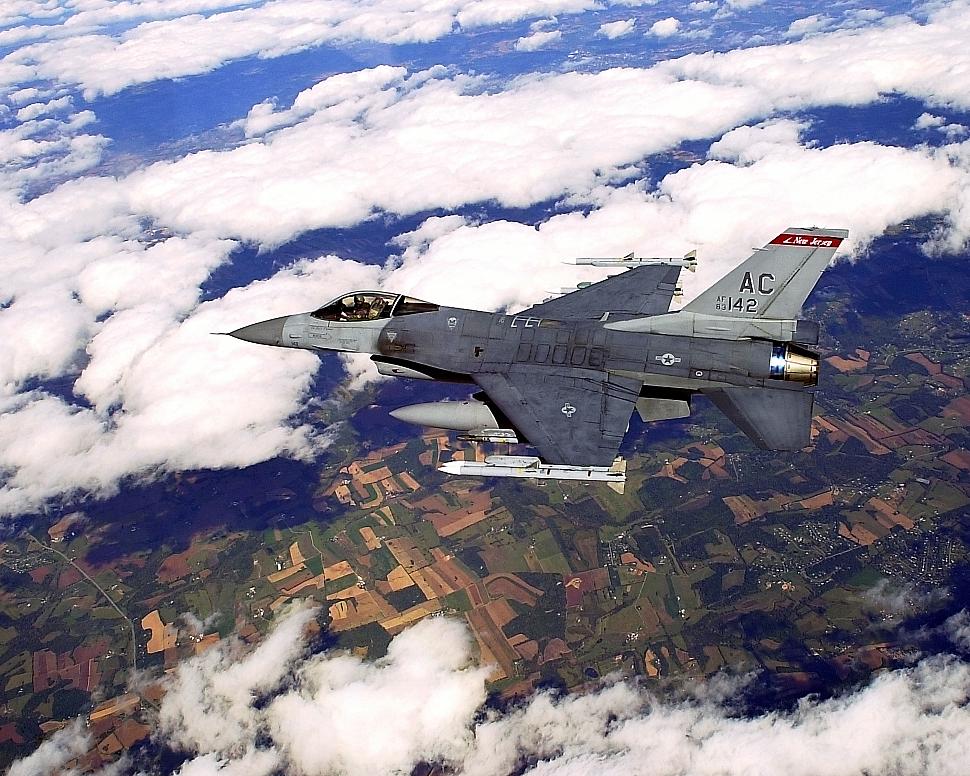Fighter Jet News
F-16 Fighting Falcon News
Pilot error blamed for forest fires in New Jersey
July 27, 2007 (by
ACC) -
USAF officials determined that the cause of the forest fire on the Warren Grove Training Range in New Jersey on May 15 was pilot error, committed when a pilot of an F-16C deployed flares at an altitude that allowed them to contact the range while still burning.

Maj. Gen. Emmett R. Titshaw, president of the Air Combat Command Accident Investigation Board, established to investigate the Air National Guard F-16 training mishap that resulted in the forest fire at the training range, released his findings at a press conference today.
The investigation team discovered that during a basic surface attack training mission, two F-16C Fighting Falcon pilots, a lead pilot and a wingman pilot assigned to the 177th Fighter Wing, Atlantic City, conducted an unscheduled "show of force" maneuver.
A show of force is a maneuver typically involving a low-altitude, high-speed pass over an area of interest to demonstrate an air power presence to an enemy force.
While executing the show of force maneuver, the wingman pilot deployed multiple countermeasure flares below the WGR minimum release altitude of 500 feet. At the time of the flare release, the pilot was unaware that the environmental conditions on the range prohibited the use of flares on the range. The use of countermeasure flares during the training mission that day was also not briefed to the range control officer or the lead pilot of the training mission. The aircraft's flares contacted the ground while still burning, causing several fires. One of these fires spread rapidly beyond the boundary of the WGR due to extreme environmental factors.
In addition, the lead pilot of the training mission did not discuss the use of flares during the training mission with the pilot who subsequently dropped the flares. The investigation also found that prior to the start of the training mission, the lead pilot failed to properly coordinate with the WGR range control officer concerning the use of flares. The board also noted as a contributing factor the failure of the range control officer to convey that flares were prohibited on the range at the time of the training mission.

A USAF F-16C from the New Jersey Air National Guard's 177th Fighter Wing flies a combat air patrol mission in the Northeastern United States in support of Operation Noble Eagle.
The investigation team discovered that during a basic surface attack training mission, two F-16C Fighting Falcon pilots, a lead pilot and a wingman pilot assigned to the 177th Fighter Wing, Atlantic City, conducted an unscheduled "show of force" maneuver.
A show of force is a maneuver typically involving a low-altitude, high-speed pass over an area of interest to demonstrate an air power presence to an enemy force.
While executing the show of force maneuver, the wingman pilot deployed multiple countermeasure flares below the WGR minimum release altitude of 500 feet. At the time of the flare release, the pilot was unaware that the environmental conditions on the range prohibited the use of flares on the range. The use of countermeasure flares during the training mission that day was also not briefed to the range control officer or the lead pilot of the training mission. The aircraft's flares contacted the ground while still burning, causing several fires. One of these fires spread rapidly beyond the boundary of the WGR due to extreme environmental factors.
In addition, the lead pilot of the training mission did not discuss the use of flares during the training mission with the pilot who subsequently dropped the flares. The investigation also found that prior to the start of the training mission, the lead pilot failed to properly coordinate with the WGR range control officer concerning the use of flares. The board also noted as a contributing factor the failure of the range control officer to convey that flares were prohibited on the range at the time of the training mission.
Courtesy of ACC Public Affairs office
Related articles:
Forum discussion:
Tags
- Flare from F-16 ignites wildfire (2007-05-16)
- F-16 "Fly-by shooting" on New Jersey school (2004-11-04)
- F-16 Fighting Falcon news archive
Forum discussion:
- What's with New Jersey - Wildfire ( 16 replies)
Tags
